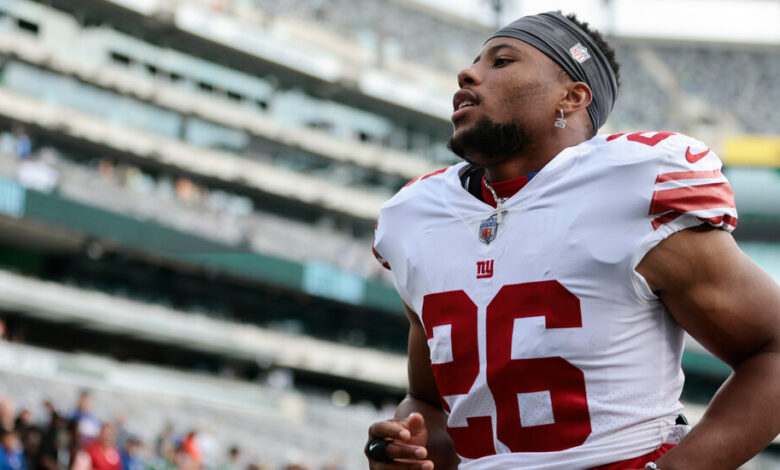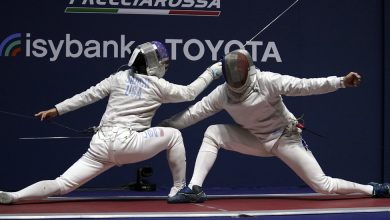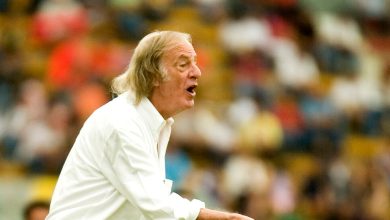The Key to Saquon Barkley’s Football Future? Playing With ‘No Fear.’

EAST RUTHERFORD, N.J. — For just a moment, during a joint practice with the Jets at the end of August, Giants running back Saquon Barkley reversed time.
In 11-on-11 drills, he collected a handoff, cut back from the line of scrimmage and swiftly evaded a defender for a modest gain. The play itself was flashy but, more important for Barkley, it was uneventful.
His right knee, surgically repaired in 2020, did not buckle. His ankles, which troubled him in 2019 and again last season, did not roll. Instead, Barkley displayed long-forgotten speed and ably changed direction in ways that were reminiscent of his 2018 season, when he rushed for 1,307 yards and 11 touchdowns and created highlights by often not surrendering on first contact.
Those bulldozing runs won him a Rookie of the Year Award and turned him into an endorsement magnet. But injuries in each of the past three seasons have dampened expectations that Barkley, drafted No. 2 overall in 2018 over the franchise quarterbacks Josh Allen and Lamar Jackson, would successfully carry the Giants into their post-Eli Manning future.
Under two head coaches since 2018, the Giants’ offense has ranked no higher than 16th in scoring and the team has amassed a 19-46 record.
Barkley, 25, enters the last season of his rookie contract as one of the last remnants from bygone teams and leadership groups, at a time when N.F.L. franchises have hesitated to give running backs massive second deals. The expiring contracts of Barkley, quarterback Daniel Jones and other veterans set to come off the books after the 2022 season could give Joe Schoen, the first-year general manager, $54.4 million in projected cap space to rebuild.
Barkley is hoping to prove to the Giants’ new decision makers — or potential suitors around the league — to stake him again.
“It’s a turning point for my legacy,” Barkley said in an August interview at the Giants’ facility. “This is a year I can turn it around. That’s my focus, to come out here, turn that around and put all the bad luck behind me.”
The bad luck to which he referred: Barkley missed 21 games over the last three seasons, including four games last year because of an ankle injury. He played in just five quarters in 2020 after he tore the anterior cruciate ligament in his right knee in just the Giants’ second game of the season.
Barkley said the setbacks diminished his confidence, a fact he said was particularly noticeable when he watched film of those second- and third-year games when he did not shake off defenders or perform cutbacks as he did that first N.F.L. season and in college at Penn State.
“You can look at yourself in the mirror, and you can tell yourself that, ‘I’m back,’ but your body can go out there and react a different way,” he said.
Barkley played the final eight games last season, and said he felt refreshed heading into the off-season, his first since after his rookie season in which he did not have to rehabilitate an injury. But the team hired Schoen and Coach Brian Daboll, both former Buffalo Bills assistants, in January and by the scouting combine in March, Schoen said he was “open to anything” when asked if he would trade Barkley.
Weeks later, he clarified that he had accepted other teams’ inquiries, as he would for any player, but was not actively shopping Barkley. Schoen said he personally called him to assure him of his roster spot and has since sought to encourage Barkley, who has delivered an impressive training camp and preseason.
“He went No. 2 in the draft for a reason,” Schoen said in an interview on Aug. 26. “He’s a super talented player and a great person and has been a great leader so far. He’s obviously one of the pieces you’re excited to work with when we got here.”
Both Daboll and Schoen deflected when asked if they would commit to him long-term, saying the topic was premature. If the Giants do not extend Barkley’s contract after the season, he would enter the open market as a free agent.
Barkley’s crossroads comes as star running backs have become devalued around the N.F.L. Only four running backs have been drafted in the first round since 2019, and rushers like the Panthers’ Christian McCaffrey and the Cowboys’ Ezekiel Elliot dipped in production and got injured after signing lucrative long-term contracts. Teams instead have increasingly relied on a cadre of rushers that typically includes younger players drafted in later rounds, rather than a single featured back.
Barkley said he understands that trend, but disagrees with it.
“Every position in the N.F.L. is valuable — you need someone good at every position,” Barkley said.
He added, “I can see why people can look at it that way and see where the game is today, but I can make the same argument for some other players that are running backs who are the heart and soul of their teams.”
Mike Tannenbaum, a former Jets general manager and an ESPN analyst, said it was not clear how the Giants would handle a potential extension if Barkley played well, as expected.
“He’s a fascinating discussion because he is a dynamic difference-maker and those players are really hard to find,” Tannenbaum said. “But how much do you pay him? What’s the structure of the contract? What’s the guarantees? That’s difficult to determine because of his history.
Barkley said “he does not feel pressure” for this year, despite recognizing his circumstances, and is optimistic that he’ll return to his rookie form.
“I just want to go out there and play the game that I love,” Barkley said. “And if it don’t go that way, then, hey, so be it, it just wasn’t in the cards for me to be like that. I’m coming at a place with no fear and just going out there and balling.”




